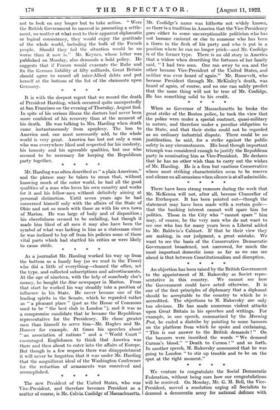As a journalist Mr. Harding worked his way up from
the bottom as a handy boy (so we read in the Times) who did a little of everything—cleaned the office, set the type, and collected subscriptions and advertisements.. At the age of nineteen, with the help of somebody else's money, he bought the Star newspaper in Marion. From that start he worked his way steadily into a position of influence in his State. He never became one of the leading spirits in the Senate, which he regarded rather as " a pleasant place " (just as the House of Commons used to be " the best club in London "), and it was as a compromise candidate that he became the Republican representative for the Presidency. He chose greater men than himself to serve him—Mr. Hughes and Mr. Hoover for example. At times his speeches about " an association of nations " and a " World Court " encouraged Englishmen to think that America was there and then about to enter into the affairs of Europe. But though in a few respects there was disappointment it will never be forgotten that it was under Mr. Harding that the magnificent ideal of the Washington Conference for the reduction of armaments was conceived and accomplished. * * * *


































 Previous page
Previous page